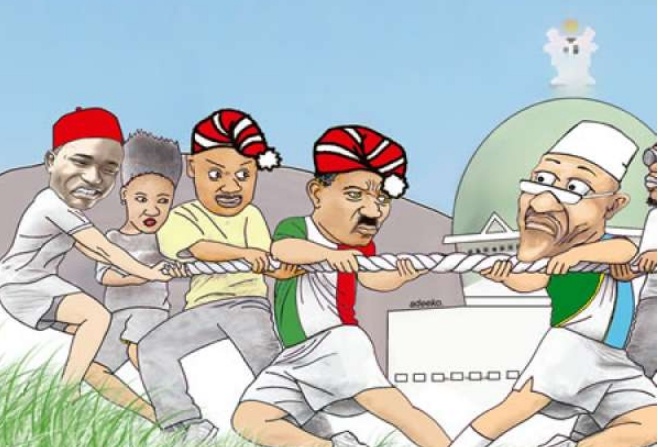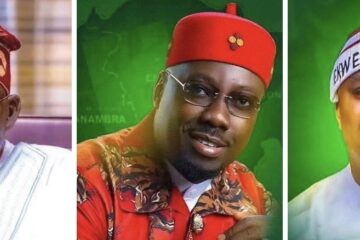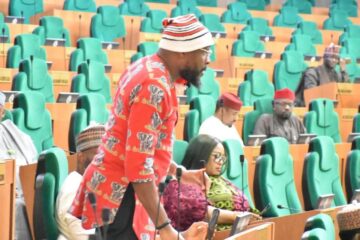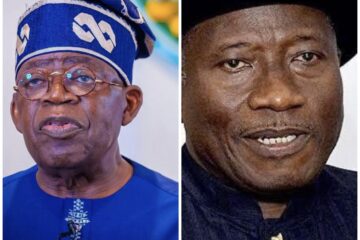The chips are down, more clouds are gathering, and soon the bubble will burst. Barely 11 months to the 2023 general elections, there is a central thread of discourse in the nation on the possibility of a president of Igbo extraction. The hypothesis is hinged on history and contemporaneous power shift in Nigeria. Proponents of the quest for a Nigerian leader from the Igbo dominated South east axis premise it on six standpoints: Tripod nature of the nation, equity, justice, unity, peace and fair play. Hard- headed as the clamour has assumed, many champions of the clamour have fallen by the wayside, while new recruits have been made from even outside the Igbo enclave depending on interests and affiliations.
The two leading political parties from where the extractive redemption could be realized: All Progressives Congress, APC, and Peoples Democratic Party, PDP are heightening guesses and leaving people confused and in suspense. The power play and intrigues are suffused with obdurate greed and vile politics. The leading presidential hopefuls are big names who have had their day in the past and whose dreams of leading the nation defies the basic notions of aggregated national good and power shift. Their financial war chest, massive structures, larger than thou image, media visibility and alliances inexorably subsume the Igbo presidential quest.
Former governor of Abia State and current chief whip of the senate, Dr Orji Uzor Kalu had as early as 2012 said that a president of Igbo extraction should not be party based but built on the consensus of Nigerians. He explained that it was on the basis of the strain that a non- partisan group, ‘Njiko Igbo” was formed. “ I need to be neutral at all levels in achieving a unifying platform for this laudable project. However, we are ready to support any political party that zones its presidential ticket to the South east, which is in line with our cardinal objective”. But despite this belief, the undercurrents in the run- up to the 2023 general elections have stood this logic on its head. Every political move is straight jacketed to void power shift arrangement among the geo- ethnic groups that has been the engine oil of the political process in the nearly two and half decades of this dispensation.
The plot is hydra- headed, ruinous and embellished with ingredients that will truncate zoning arrangement in perpetuity. Several meetings within the Opposition PDP that started the arrangement in the first place have ended without a firm resolve and consensus to engineer it to fruition.
The flipside of it that “ it is anti –democratic, non- universal and exclusionist have been rehearsed to nail its coffin. The anti- Igbo president clan has trumped up massive propaganda to whip up sentiments against the Igbo and abort the idea of a president from Igbo land ever ruling the country- at least not in their lifetime. Added to this is a surfeit of cooked up innuendos and blackmail that a president from Igbo land will not be any different from putting Nnamdi Kanu to rule Nigeria, suggesting an apparent balkanization.
Those who were not even born before the Nigeria/ Biafra war go back in history to regurgitate and excavate horrifying incidents of irredentism in prosecuting the war. Irredentism in warfare is opposite and equal, but in their eyes it is convenient to encase it on the Igbo alone. Today, the project is left flying in the air. And this has emboldened key political actors from the north and west to rev up their presidential campaign machinery.
The few Igbo presidential aspirants have been left in the lurch, and on a limb. Peter Obi and Pius Anyim, the front runners have been turned apologetic, concentrating more on offering explanations of their nationalistic outlook rather than the intrinsic qualities needed to push Nigeria ahead. The governors of the party who hold the levers are aggressively positioning and canvassing for one of their own either as president or vice president.
The leading Turks within the party are enchanted with their own goals, rather than take a cross view of the polity and the values that will make the party return to power – the real reason why the party lost power in 2015. A source from one of them told Daily Sun that the zonal slot will be determined when their rival APC concludes their own processes. As the waiting games build up and heels, the anti- Igbo presidency group chalks up more gains and permeates the rubric even deeper. For the PDP, the Igbo president for Nigeria is formless, denied of steam and left lying fallow with the objective of going either way. Unless the calculation changes soon, former vice president Atiku Abubakar is in pole position to clinch the ticket. Many powerful politicians in the party including those from Igbo land are already lining up behind him, Daily Sun learnt.
Of the about four meetings held since January this year by powerful caucuses in the ruling APC, not even a single popular Igbo politician in their midst raised a finger on the profiling of the Igbo, apparently because of self- interest or the craving for popular acceptance nationally. But try as they would, the embers of the Igbo presidency project still festers, refusing to die in the hearth. Moral suasion appears to have worked magic as the initial hard-line against the clamour has waned.
Despite the desperate campaign of the party’s leader, Bola Tinubu to succeed Buhari, and the underground interest of the vice president, Yemi Osinbajo , it has not been an easy sail for them. None of the duo, who are from the South west is up in the plan to install the chairman of the party in their forthcoming national convention.
A sure sign that their hold on the structures of the party is slippery. Indeed, so much was the commotion and politicking that the governors of the party squared up and are now currently arrayed against the president in his choice. Head or tail, given the tradition of the party, the president will have the final say on who emerges as the chairman, except in situations where he is not interested.
Elders, groups in the hay
Sensationally, some Elders and groups have taken the gauntlet to stand in the gap for the politicians. Prominent among them is the Igbo Elders Consultative Forum ( IECF) led by former governor of old Anambra State, Dr Chukwuemeka Ezeife.
Recently, the group threatened heavy sanctions against any Igbo politician that would accept to be running mate to any person. The group also foreclosed the continued stay of the Igbo in the entity called Nigeria should the Igbo be denied the ticket of the president in the presidential race.
“ We are waiting for them( political parties), as they will meet their waterloo this time if they insist on shortchanging the South east people this rare opportunity of producing a credible, patriotic, detribalized and dynamic president of Nigeria in 2023.
He urged Igbo politicians interested in running for the office to pursue it with “every sense of seriousness, vigour and commitment” . He said that “legally, morally, strategically, it is the turn of the South east to produce the next president of the country as the other zones have been given the opportunity to serve the country in that capacity”. Also, the Association of Arewa Community in Igbo land is drumming support for the project.
Its national president, Alhaji Mohammed Umaru while appealing for support for the project recently described the Igbo as “accommodating”. In a similar vein, SEFORP2023 pledged to collaborate with other interest groups from other regions to give the country a credible leader from the South east region in 2023. National Coordinator of the group, Rev Okechukwu Obioha anchored his reason on the need for fairness and justice to all geo- political zones in Nigeria.
In the Igbo Character
Until the second decade of the 20th century, Igbo were not regarded as a monolithic group. They comprised more than 200 segmented groups which operated as distinct societies and were organized on patrilineal clans or lineages made up of 30 villages or local communities bounded together by a common language, customs and beliefs (Anber, 1967:169).
The monolithic kingdoms, hierarchical administrative systems and centralized political structures that existed in the Hausa emirates of northern Nigeria and the Yoruba constitutional monarchies of western Nigeria were non- existent in Igbo societies. The bulk of literature in Igbo history and social anthropology also casts the pre- colonial igbo as “stateless” “, acephalous”, “ segmentary” and “ individualistic”. This classification may have informed the gradients that are propelling the clamour for Igbo presidency which is so far non- formalized, and with dispersed authority.
Presidency or secession
The agitation for secession from Nigeria by some groups in the South East geo- political zone has posed grave strains on the presidency quest by the zone. As a dimmer, it has taken some shine out of the project and presents the picture of a confused people.
However, both agitations can be situated within the prisms of equity, justice, peace and good conscience. The prime political, business and traditional elite appear to cast their lot on the presidency of Nigeria. Secession from Nigeria from all indications and sources is deemed as a last ditch consideration and option. Secretary, Igbo Elders Council, Federal Capital Territory,( FCT) Chapter, Charles Nwaekeaku echoed this opinion recently .
He said as one who believes in justice and fairness, Nnamdi Kanu, detained leader of IPOB( Indigenous Peoples of Biafra) which is championing secession from Nigeria “ should have done whatever it takes to ensure that the next president of Nigeria should come from the South east”. He is not alone on this. The Christian Social Movement of Nigeria,( CSMN), an arm of the Christian Association of Nigeria,(CAN) is throwing its weight behind the struggle.
The group wants the president to emerge from the South east without fail in 2023. Former Vice Chancellor of the Ahmadu Bello University, Zaria Prof Ango Abdullahi, and Afenifere leader Ayo Adebanjo, among others, are some of the positive voices for the Igbo presidency struggle. A good number of them see it as the real tonic that will re-unite the country, bring down secessionist tension and play the devil’s alternative in securing a progressive and peaceful nation.
Party realignments
Unending calls to shift power to the South have engendered a lot of permutations within the political circuit. While some key political players see it as inconsequential and nebulous and have since been glaciating for the presidency, others have applied caution and are at best waiting for the last bugle on where the pendulum will swing to.
A lot of realignments’ across religious and ethnic bridges are also in the offing. In the thick of the calculations, and while the decibel of the quest endures, the mantra has switched effectively to the emergence of a president of Igbo origin.
The ruling APC hierarchs are not averse to it, according to sources working on the project. The only fly in the ointment is that the body language is swaying to the Igbo in the South- South geo-ethnic zone. This disposition negates the shared principle of zoning on geo- political zone and may likely continue to fuel unrest in the core Igbo South east. Political pundits see it as a clever push to jam the heads of the Igbo in the South- south and South- east.
A chieftain of the APC, Chief Chekwas Okorie views the move as circumstantial and necessary. He said that the north and the west are more comfortable with the Igbo of the south- south than the mainstream South east. He cited the civil war between 1967- 1970 and the simmering secession struggle by IPOB to buttress his point. “The fact that the vast majority of Igbo in Rivers and Delta states allegedly colluded with then Nigerian government in truncating Biafra is historical.
Several books on the Biafra war and eyewitness accounts have corroborated this view. The ongoing bloody quest to regain Biafra is another deficit for the Igbo in the South east to attract the presidency to their zone. The democratic dispensation from 1999 till date has been mired by hostilities between the Federal Government and secessionist groups. How then can other parts of the country trust and confidently support the South east which is the theatre of the agitations in their struggle to rule the nation.” Former Deputy Chairman of the opposition PDP, Chief Olabode George also slightly echoed similar sentiments.
He said the zoning of the presidency to the south should be micro-zoned to the South east without making differentiation on the geo- political zone. He dismissed calls by some politicians to cede the ticket to the South- west .
The internal squabble in the APC which has slowed down the momentum of its national convention is as a result of the zoning problem. The initial gambit was to throw it open, but a sustained resistance by some influential elements within the government and party created a review which bought about a reprieve and the new soft landing for the Igbo. Zoning of national elective positions is determined by the mood of the nation beginning from the present democratic dispensation in 1999.
The two leading political parties then, PDP and ANPP (All Nigeria Peoples Party) fielded presidential candidates from the South west to assuage them as they were smarting from the hurt of the annulled June 12, 1993 presidential election, presumably won by their own kin, the late MKO Abiola.
When the tenure of Chief Olusegun Obasonjo ended in 2007, the north through Umaru Yar’adua took over, but his death in office forced his deputy, Goodluck Jonathan who is from the South- south to take over and complete his tenure.
His attempt to re- contest in 2015 was met with a stiff resistance as it was ultimately geared towards dismantling the unwritten zoning agreement in place. Those who reaped from the success of the arrangement are now unbelievably, the czars of anti – Zoning. An x-ray of the APC shows it has its strength in the South- west, north- west, north- east, and north- central.( Four geo- political zones).
PDP is strong in the six zones of the nation but with a stronghold in the South east and South- south. However, through uncanny means and fiat, the APC is fast encroaching on, and building nests in the South- east , controlling two states of Imo and Ebonyi with senators, House of Representative members, State House of Assembly members, local government chairmen and councilors, etc. The presidential gladiators from the north ahead of the 2023 elections are heavyweight politicians who are household names and many believe have been in the thick of the politics of this dispensation. They have also accrued political baggages.
The South- east, which is the only zone yet to taste political power either as president or Vice president counts on this secluded strand to actualize the dream of a president from the zone in 2023. A nationally acceptable Igbo presidential aspirant stands a good chance of claiming the position. At the moment, the situation is a Catch 22. If the two parties, against all permutations pick their presidential candidate from the South- east, a long drawn political nut would have been knocked off. Nigerians will then pick their choice based on qualifying attributes and incipient core national values. If one party picks their candidate from the north and the other from the south- east, primordial national voting pattern will emerge to upset the applecart of zoning with the northern candidate likely to brace the tape of victory.
If APC produces its candidate from the Igbo south – south and the PDP anchors its presidential hopeful in the north, a stalemate may be created as the northern votes may be shared by both parties. The power of incumbency at the central government and in most states controlled by the party in the north will be at play to neutralize the essentials of ethnicity and religion in the traditional voting patterns of the people.
This notion may also apply in the South- east who are likely to view the plot as a systemic plot of marginalization and would in most probability go for the northern candidate to spite their brothers from the south- south. A proper understanding of how Nigerian politics works is crucial in realizing the political goals of a group, a region or individuals. Political interests count the most in support base and there are always windows for alliances, friendship, horse trading, and the capacity to convince others towards a particular political cause or individual. Current political gladiators from the East are not clout – studded.
Most of them do not have friends and fellowship across Nigeria, are not controversy free, have baggage and are still reeling with rustic knowledge of the nuances of Nigerian politics. Some of them are still bugged down with EFCC invitations and trials. A fresh face with intimidating credentials is what the South and the South- east in particular need to galvanize Nigerians to the precincts of a president of Igbo origin.
[Sun]




